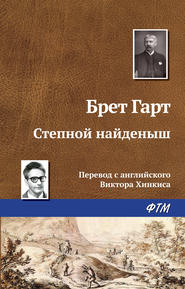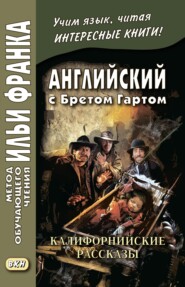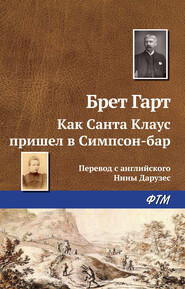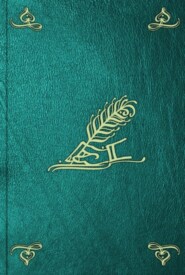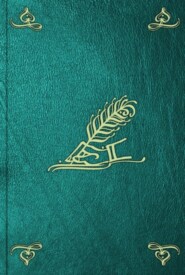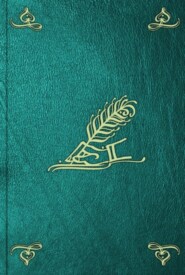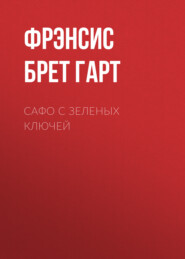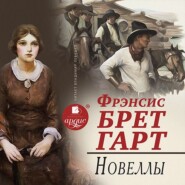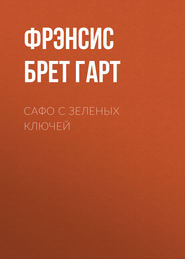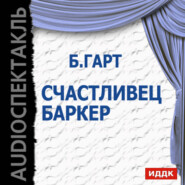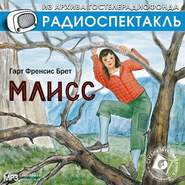По всем вопросам обращайтесь на: info@litportal.ru
(©) 2003-2025.
✖
Gabriel Conroy
Автор
Год написания книги
2017
Настройки чтения
Размер шрифта
Высота строк
Поля
"We have no further questions to ask, your Honour," he said, quietly, and sat down.
The effect of this simple, natural, and perfectly consistent action was tremendous! In the various triumphs of Arthur's successful career, he felt that he had never achieved as universal and instantaneous popularity. Gabriel was forgotten; the man who had worked up this sensation – a sensation whose darkly mysterious bearing upon the case no one could fathom, or even fared to fathom, but a sensation that each man confidently believed held the whole secret of the crime – this man was the hero! Had it been suggested, the jury would have instantly given a verdict for this hero's client without leaving their seats. The betting was two to one on Arthur. I beg to observe that I am writing of men, impulsive, natural, and unfettered in expression and action by any tradition of logic or artificial law – a class of beings much idealised by poets, and occasionally, I believe, exalted by latter-day philosophers.
Judge Boompointer looked at Colonel Starbottle. That gentleman, completely stunned and mystified by the conduct of the defence, fumbled his papers, coughed, expanded his chest, rose, and began the cross-examination.
"You have said your name was – er – er – Johnny – er – er – (the Colonel was here obliged to consult his papers) – er – John Dumbledee. What was your idea, Mr. Dumbledee, in – er – assuming the name of – er – er – Gabriel Conroy?"
Objected to by counsel for defence. Argument: – Firstly, motives, like beliefs, not admissible; case cited, Higginbottom v. Smithers. Secondly, not called out on Direct Ex.; see Swinke v. Swanke, opinion of Muggins, J., 2 Cal. Rep. Thirdly, witness not obliged to answer questions tending to self-crimination. Objection overruled by the Court. Precedent not cited; real motive, Curiosity. Boompointer, J. Question repeated: —
"What was your idea or motive in assuming the name of Gabriel Conroy?"
Gabriel (cunningly, and leaning confidentially over the arm of his chair): "Wot would be your idee of a motif?"
The witness, amidst much laughter, was here severely instructed by the Court that the asking of questions was not the function of a witness. The witness must answer.
Gabriel: "Well, Gabriel Conroy was a purty name – the name of a man ez I onst knew ez died in Starvation Camp. It kinder came easy, ez a sort o' interduckshun, don't ye see, Jedge, toe his sister Grace, ez was my wife. I kinder reckon, between you and me, ez thet name sorter helped the courtin' along – she bein' a shy critter, outer her own fammerly."
Question: "In your early acquaintance with the deceased, were you not known to him as Gabriel Conroy always, and not as – er – er – Johnny Dumbledee?"
Arthur Poinsett here begged to call the attention of the Court to the fact that it had not yet been shown that Gabriel – that is Johnny Dumbledee – has ever had any early acquaintance with the deceased. The Court would not fail to observe that counsel on the direct examination had restricted themselves to a simple question – the name of the prisoner.
Objection sustained by Judge Boompointer, who was beginning to be anxious to get at the facts. Whereat Colonel Starbottle excepted, had no more questions to ask, and Gabriel was commanded to stand aside.
Betting now five to one on Arthur Poinsett; Gabriel's hand, on leaving the witness box, shaken cordially by a number of hitherto disinterested people. Hurried consultation between defendant's counsel. A note handed to Colonel Starbottle. Intense curiosity manifested by Manuela and Sal regarding a closely veiled female, who enters a moment later, and is conducted with an excess of courtesy to a seat by the gallant Colonel. General impatience of audience and jury.
The defence resumed. Michael O'Flaherty called; nativity, County Kerry, Ireland. Business, miner. On the night of the murder, while going home from work, met deceased on Conroy's Hill, dodging in among the trees, for all the wurreld like a thafe. A few minutes later overtook Gabriel Conroy half a mile farther on, on the same road, going in same direction as witness, and walked with him to Lawyer Maxwell's office. Cross examined: Is naturalised. Always voted the Dimmycratic ticket. Was always opposed to the Government – bad cess to it – in the ould counthry, and isn't thet mane to go back on his principles here. Doesn't know that a Chinaman has affirmed to the same fact of Gabriel's alibi. Doesn't know what an alibi is; thinks he would if he saw it. Believes a Chinaman is worse nor a nigger. Has noticed that Gabriel was left-handed.
Amadee Michet, sworn for defence; nativity, France. Business, foreman of La Parfait Union. Frequently walks to himself in the beautiful grove on Conroy's Hill. Comes to him on the night of the 15th, Gabriel Conroy departing from his house. It is then seven hours, possibly more, not less. The night is fine. This Gabriel salutes him in the American fashion, and is gone. Eastward. Ever to the east. Watches M. Conroy because he wears a triste look, as if there were great sadness here (in the breast of the witness' blouse). Sees him vanish in the gulch. Returns to the hill and there overhears voices, a man's and a woman's. The woman's voice is that of Madame Conroy. The man's voice is to him strange and not familiar. Will swear positively it was not Gabriel's. Remains on the hill about an hour. Did not see Gabriel again. Saw a man and woman leave the hill and pass by the Wingdam road as he was going home. To the best of his belief the woman was Mrs. Conroy. Do not know the man. Is positive it was not Gabriel Conroy. Why? Eh! Mon Dieu, is it possible that one should mistake a giant?
Cross examined. Is a patriot – do not know what is this Democrat you call. Is a hater of aristocrats. Do not know if the deceased was an aristocrat. Was not enraged with Madame Conroy. Never made love to her. Was not jilted by her. This is all what you call too theen, eh? Has noticed that the prisoner was left-handed.
Helling Dittmann; nativity, Germany. Does not know the deceased; does know Gabriel. Met him the night of the 15th on the road from Wingdam; thinks it was after eight o'clock. He was talking to a Chinaman.
Cross examined. Has not been told that these are the facts stated by the Chinaman. Believes a Chinaman as good as any other man. Don't know what you mean. How comes dese dings? Has noticed the prisoner used his left hand efery dime.
Dr. Pressnitz recalled. Viewed the body at nine o'clock on the 16th. The blood-stains on the linen and the body had been slightly obliterated and diluted with water, as if they had been subjected to a watery application. There was an unusually heavy dew at seven o'clock that evening, not later. Has kept a meteorological record for the last three years. Is of the opinion that this saturation might be caused by dew falling on a clot of coagulated blood. The same effect would not be noticeable on a freshly bleeding wound. The hygrometer showed no indication of a later fall of dew. The night was windy and boisterous after eight o'clock, with no humidity. Is of the opinion that the body, as seen by him, first assumed its position before eight o'clock. Would not swear positively that the deceased expired before that time. Would swear positively that the wounds were not received after eight o'clock. From the position of the wound, should say it was received while the deceased was in an upright position, and the arm raised as if in struggling. From the course of the wound should say it could not have been dealt from the left hand of an opponent. On the cross examination, Dr. Pressnitz admitted that many so-called "left-handed men" were really ambidexterous. Was of the opinion that perspiration would not have caused the saturation of the dead man's linen. The saturation was evidently after death – the blood had clotted. Dr. Pressnitz was quite certain that a dead man did not perspire.
The defence rested amid a profound sensation. Colonel Starbottle, who had recovered his jaunty spirits, apparently influenced by his animated and gallant conversation with the veiled female, rose upon his short stubby feet, and withdrawing his handkerchief from his breast, laid it upon the table before him. Then carefully placing the ends of two white pudgy fingers upon it, Colonel Starbottle gracefully threw his whole weight upon their tips, and leaning elegantly toward the veiled figure, called "Grace Conroy."
The figure arose, slight, graceful, elegant; hesitated a moment, and then slipped a lissom shadow through the crowd, as a trout glides through a shallow, and before the swaying, moving mass had settled to astonished rest, stood upon the witness-stand. Then with a quick dexterous movement she put aside the veil, that after the Spanish fashion was both bonnet and veil, and revealed a face so exquisitely beautiful and gracious, that even Manuela and Sal were awed into speechless admiration. She took the oath with downcast lids, whose sweeping fringes were so perfect that this very act of modesty seemed to the two female critics as the most artistic coquetry, and then raised her dark eyes and fixed them upon Gabriel.
Colonel Starbottle waved his hand with infinite gallantry.
"What is – er – your name?"
"Grace Conroy."
"Have you a brother by the name of Gabriel Conroy?"
"I have."
"Look around the Court and see if you can recognise him."
The witness with her eyes still fixed on Gabriel pointed him out with her gloved finger. "I do. He is there!"
"The prisoner at the bar?"
"Yes."
"He is Gabriel Conroy?"
"He is."
"How long is it since you have seen him?"
"Six years."
"Where did you see him last, and under what circumstances?"
"At Starvation Camp, in the Sierras. I left there to get help for him and my sister."
"And you have never seen him since?"
"Never!"
"Are you aware that among the – er – er – unfortunates who perished, a body that was alleged to be yours was identified?"
"Yes."
"Can you explain that circumstance?"
"Yes. When I left I wore a suit of boy's clothes. I left my own garments for Mrs. Peter Dumphy, one of our party. It was her body, clothed in my garments, that was identified as myself."
"Have you any proof of that fact other than your statement?"
"Yes. Mr. Peter Dumphy, the husband of Mrs. Dumphy, my brother Gabriel Conroy, and" —
"May it please the Court" (the voice was Arthur Poinsett's, cool, quiet, and languidly patient), "may it please the Court, we of the defence – to save your Honour and the jury some time and trouble – are willing to admit this identification of our client as Gabriel Conroy, and the witness, without further corroboration than her own word, as his sister. Your Honour and the gentlemen of the jury will not fail to recognise in the evidence of our client as to his own name and origin, a rash, foolish, and, on behalf of myself and my colleague, I must add, unadvised attempt to save the reputation of the wife he deeply loves from the equally unadvised and extraneous evidence brought forward by the prosecution. But we must insist, your Honour, that all this is impertinent to the real issue, the killing of Victor Ramirez by John Doe, alias Gabriel Conroy. Admitting the facts just testified to by the witness, Grace Conroy, we have no cross examination to make."
The fact of the witness, which had been pale and self-possessed, flushed suddenly as she turned her eyes upon Arthur Poinsett. But that self-contained scamp retained an unmoved countenance as, at Judge Boompointer's unusually gracious instruction that the witness might retire, Grace Conroy left the stand. To a question from the Court, Colonel Starbottle intimated that he should offer no further evidence in rebuttal.
"May it please the Court," said Arthur, quietly, "if we accept the impeachment by a sister of a brother on trial for his life, without comment or cross examination, it is because we are confident – legally confident – of showing the innocence of that brother by other means. Recognising the fact that this trial is not for the identification of the prisoner under any name or alias, but simply upon the issue of the fact whether he did or did not commit murder upon the body of Victor Ramirez, as specified in the indictment, we now, waiving all other issues, prepare to prove his innocence by a single witness. That this witness was not produced earlier, was unavoidable; that his testimony was not outlined in the opening, was due to the fact that only within the last half-hour had he been within the reach of the mandate of this Court. He would call Henry Perkins!"
There was a slight stir among the spectators by the door as they made way to a quaint figure that, clad in garments of a bygone fashion, with a pale, wrinkled, yellow face, and grey hair, from which the dye had faded, stepped upon the stand.
Is a translator of Spanish and searcher of deeds to the Land Commission. Is called an expert. Recognises the prisoner at the bar. Saw him only once, two days before the murder, in passing over Conroy's Hill. He was sitting on the doorstep of a deserted cabin with a little girl by his side. Saw the deceased twice. Once when he came to Don Pedro's house in San Francisco to arrange for the forgery of a grant that should invalidate one already held by the prisoner's wife. Saw the deceased again, after the forgery, on Conroy's Hill, engaged in conversation with the prisoner's wife. Deceased appeared to be greatly excited, and suddenly drew a knife and made an attack upon the prisoner's wife. Witness reached forward and interposed in defence of the woman, when the deceased turned upon him in a paroxysm of insane rage, and a struggle took place between them for the possession of the knife, witness calling for help. Witness did not succeed in wresting the knife from the hands of deceased; it required all his strength to keep himself from bodily harm. In the midst of the struggle witness heard steps approaching, and again called for help.
The witness' call was responded to by a voice in broken English, unintelligible to witness, apparently the voice of a Chinaman. At the sound of the voice and the approach of footsteps, the deceased broke from witness, and running backward a few steps, plunged the knife into his own breast and fell. Witness ran to his side and again called for help. Deceased turned upon him with a ghastly smile and said, "Bring any one here and I'll accuse you before them of my murder!" Deceased did not speak again, but fell into a state of insensibility. Witness became alarmed, reflecting upon the threat of the deceased, and did not go for help. While standing irresolutely by the body, Mrs. Conroy, the prisoner's wife, came upon him. Confessed to her the details just described, and the threat of the deceased. She advised the instant flight of the witness, and offered to go with him herself. Witness procured a horse and buggy from a livery stable, and at half-past nine at night took Mrs. Conroy from the hillside near the road, where she was waiting. Drove to Markleville that night, where he left her under an assumed name, and came alone to San Francisco and the Mission of San Antonio. Here he learned from the last witness, the prisoner's sister, Grace Conroy, of the arrest of her brother for murder. Witness at once returned to One Horse Gulch, only to find the administration of justice in the hands of a Vigilance Committee. Feeling that his own life might be sacrificed without saving the prisoner's, he took refuge in a tunnel on Conroy's Hill. It chanced to be the same tunnel which Gabriel Conroy and his friend afterwards sought in escaping from the Vigilance Committee after the earthquake. Witness, during the absence of Gabriel, made himself known to Mr. Jack Hamlin, Gabriel's friend and comrade in flight, and assured him of the witness's intention to come forward whenever a fair trial could be accorded to Gabriel. After the re-arrest and bailing of Gabriel, witness returned to San Francisco to procure evidence regarding the forged grant, and proofs of Ramirez's persecution of Mrs. Conroy. Had brought with him the knife, and had found the cutler who sold it to deceased eight months before, when deceased first meditated an assault on Mrs. Conroy. Objected to, and objection overruled by a deeply interested and excited Court.






